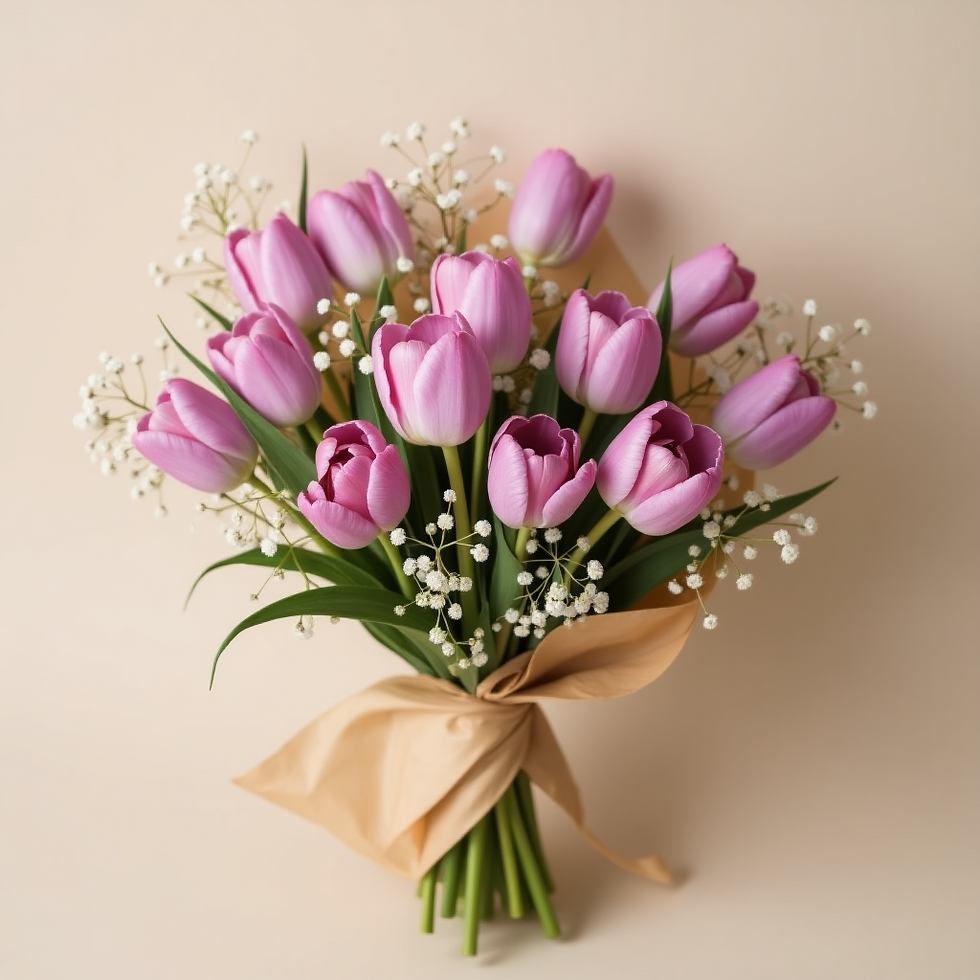Why You Should Never Store Tulips Near Ripening Fruits
- Admin
- Aug 6
- 3 min read

And What Ethylene Gas Has to Do With It!
Tulips are beloved for their clean silhouette, elegant droop, and soft colour palette — but they’re also surprisingly sensitive. If you’ve ever brought home a fresh tulip bouquet and noticed it wilting too quickly, your fruit bowl could be the culprit.
Here’s the science behind why tulips don’t play well with ripening fruits — and how to keep them fresher, longer.
The science: Ethylene gas and tulips
As fruits like apples, bananas, pears, and avocados ripen, they release a natural plant hormone called ethylene gas. It’s invisible and odourless — but highly active.
Ethylene is responsible for:
Speeding up fruit ripening
Triggering softening, colour changes, and decay
Stimulating cellular activity in nearby plant tissue
While this is great for your fruit, it’s terrible for your tulips.
Tulips, along with other ethylene-sensitive flowers like carnations and lilies, are highly reactive to even small amounts of the gas. It accelerates their aging process — leading to:
Faster petal drop
Stem droop (sooner than their natural arch)
Shortened vase life
Discoloration or uneven blooming
So if you’ve placed your bouquet next to a bowl of bananas or a pile of pears — even overnight — that’s likely why they faded so quickly.
Why tulips are more sensitive than other flowers
Not all flowers react to ethylene the same way.Tulips are part of a group of ethylene-sensitive cut flowers, meaning they can’t metabolise the gas efficiently.
This sensitivity is heightened by:
Singapore’s warm, humid climate (ethylene builds up faster)
Closed indoor environments like kitchens or bedrooms
Low airflow or still air around the bouquet
Older flowers — the more mature, the more reactive
That’s why even a seemingly harmless setup — tulips on the dining table, fruit nearby — can reduce their lifespan by several days.
How to protect your tulips at home
You don’t need a lab to keep your tulips happy. Just follow these simple care rules:
Keep away from ripening fruitsStore your bouquet in a separate room, far from any fruit bowl or grocery bag.
Avoid closed cupboards or low-airflow areasPlace the flowers in open, cool spaces — living rooms or hallways work well.
Change water dailyFresh water dilutes ethylene residues and keeps stems hydrated.
Use a tall vase with room to archTulips continue growing after they’re cut, and they’ll naturally lean — give them space to curve.
Cut stems at an angle before placing in waterThis helps them drink more easily and stay upright longer.
FAQ: Tulips & Fruit Storage
1. Can I keep tulips near unripe fruits?
It’s best not to. Even underripe fruits release small amounts of ethylene as they begin to ripen.
2. What about other flowers? Are they safe near fruits?
Some are more resistant — but tulips, carnations, lilies, and daffodils are all ethylene-sensitive. Keep them separate just to be safe.
3. Do supermarkets or florists treat flowers with anti-ethylene sprays?
Some large growers do, but Oscar Blooms doesn’t use chemical preservatives. Instead, we focus on freshness, proper handling, and made-to-order preparation.
4. How long should tulips last in the vase?
With proper care and storage away from fruits, Oscar Blooms tulips should last 5–7 days — sometimes longer in air-conditioned settings.



Comments